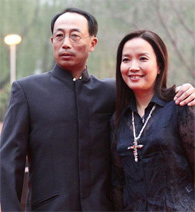Lü, winner of the Golden Horse Best Actress Award in 2010 and a born-again evangelical, had enthusiastically retweeted the homophobic comments on Sina Weibo by a Chinese pastor in Rochester, New York decrying the passage of same-sex marriage in the state.

This sparked off an intense debate that began with a call by gay activists for the boycott of Lü's movies and has hogged headlines across greater China in the subsequent week. As celebrities, writers and academics alike joined in the whirlwind of debate, the Golden Horse Awards decided to rescind its invitation to Lü to present this year's awards.
In the report on the programme "24 Hours" on the CCTV News channel, host Qiu Qiming (邱启明) held out unusually harsh words for Lü Liping, urging her to "reconsider her ways". He said, "We respect the faith of individual celebrities, and we allow them to have their own point of view on issues. But, that does not mean that we agree that a person of such influence should have the power to openly discriminate against certain communities in China."
”There is no doubt," Qiu added, "that the sexual orientation of certain people in our midst are different from the rest of us. But they are also diligently contributing to society. Gay people, like us, have the right to exist and develop themselves in society, and this right should not be overtaken by any other concept.“
And in a reference to Voltaire's famous aphorism, Qiu said in closing, "We'd like to say a word to the gay community -- and it's something we've all heard many times over -- I may not agree with the way you live, but I will defend your right to be different from me."
The state-owned broadcaster's slapping down of Lü Liping for crossing the line may be indicative of the government's wariness of the potential rise of political Christianity in China and the import of cultural clashes from the west.
Within the gay community, while many are understandably euphoric over the unexpected turn of events from the most unexpected source, there are others who remain unimpressed that this will bring about any real change.
For starters, China's nascent gay movement continues to be too fragmented and impoverished to pose any real challenge to the government on policy matters. And it will continue to remain so for the foreseeable future as it struggles to find its voice on the public square.
This article was first published by Shanghaiist on Jun 22, 2011 and is republished with permission.
(In Chinese)
